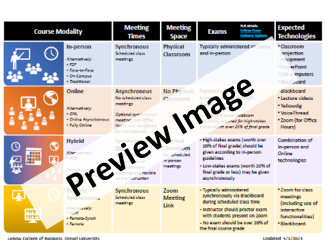In addition to traditional in-person classes, the LeBow College of Business offers courses in a range of formats that incorporate online learning. While some of Drexel’s systems label these formats as instructional methods, LeBow’s Instructional Technology department refers to them more specifically as course modalities or course delivery methods.
This article provides details on the four course modalities offered at LeBow: in-person, online asynchronous, hybrid, and online synchronous. Each modality description includes the types of learning (synchronous vs. asynchronous), technologies, and exam formats that are typically utilized. While there may occasionally be unique considerations, these guidelines should apply for the majority of LeBow courses.
Defining Synchronous and Asynchronous Learning
The terms synchronous and asynchronous are often used when referring to types of learning, class meetings, and even entire courses.
- Synchronous indicates that the instructor and students are expected to attend live class meetings held at a pre-scheduled time. These meetings may take place in-person or online using webinar technology such as Zoom.
- Asynchronous denotes that the instructor and students are not required to attend regularly scheduled live class meetings. Instructors use course technologies to facilitate learning experiences and communication, giving students the flexibility to participate on their own schedule while staying current with the course content.

Course Modality Table
A full-color table containing the essential details of LeBow’s course delivery modalities can be accessed using the following link:
LeBow Course Modalities.pdf
Course Modality Descriptions
In-person (Also called: F2F, Face-to-Face, On-Campus)
- In-person courses are synchronous. All or most class meetings are held at a planned time in a physical classroom.
- Expected technologies include classroom projection equipment, PowerPoints, use of tools such as Poll Everywhere, and occasionally, students’ own laptops and other devices. The course’s Learning Management System (or LMS) may also be used during or between classes, and may include assignments completed through a textbook publisher integration.
- Exams are typically paper-based. Instructors can contact LeBow Tech for assistance with Remark software (similar to Scantron test scoring).
- NO take-home exams! (this includes asking students to download an exam file, fill in their answers, then save and submit the file)
- For more information, see LeBow Exam Delivery Options.
Online Asynchronous (Also called: ONL, Online, Fully Online)
- Instructors build detailed course content and structures in the LMS, using instructional technologies to facilitate students’ learning experiences.
- Students are given more flexibility to participate on their own schedule while being expected to stay current with the course content from week to week.
- Synchronous meetings and office hours may occasionally be offered, but students are almost never required to attend. In lieu of attending a synchronous meeting, students may sometimes be required to asynchronously view a meeting recording at a later time.
- Though they are rare, any synchronous meeting requirements should be mentioned in the term master schedule and/or course syllabus.
- Expected technologies include the LMS, instructor-recorded videos, Yellowdig or other course discussions, VoiceThread presentations, publisher integrations, and Zoom (for office hours).
- Exams are typically administered through the LMS. Proctoring with Respondus Lockdown Browser and Webcam Monitor is required for high-stakes exams, but are also encouraged to be used under that threshold.
- For more information, see LeBow Exam Delivery Options.
Hybrid (Also called: HYB)
- Hybrid courses make use of multiple modalities. Most commonly, half of the class meetings are in-person (held synchronously in a physical classroom), while the other half of the class is composed of online asynchronous activities.
- Hybrid course formats and scheduling will vary depending on the instructor, department, and course. Instructors should determine their plans in consultation with their department heads.
- Any expected synchronous meetings should be communicated to students ahead of time in the term master schedule and in the course syllabus.
- Expected technologies include the LMS, and a combination of classroom and online technologies listed above.
- NO take-home exams! (this includes asking students to download an exam file, fill in their answers, then save and submit the file)
- Exams may be given in either of the course’s main delivery formats. Proctoring and Lockdown Browser should be used as specified for the exam’s specific delivery format and stakes-level.
- For more information, see LeBow Exam Delivery Options.
Online Synchronous (Also called: OSY; previously REM, Remote Synchronous, Remote)
- Online synchronous course meetings take place at a scheduled time, but students attend class virtually via Zoom (or another approved webinar technology) instead of a physical classroom.
- Expected technologies include the LMS and Zoom (typically including participation in voice and/or webcam interaction, screen share, chat, polls, and breakout rooms)
- Exams are typically administered synchronously during the regular scheduled class time. They should be proctored by the instructor with students present on Zoom.
- Lockdown Browser is recommended for Medium stakes exams, and required for High stakes exams.
- NO take-home exams! (this includes asking students to download an exam file, fill in their answers, then save and submit the file)
- For more information, see LeBow Exam Delivery Options.
If you have any questions, or would like assistance building a strong course in any of these modalities, please contact the Instructional Technology department at 215-895-2314 or lebowintech@drexel.edu.